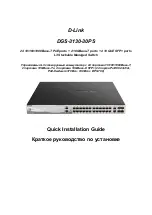
Routing Policies
Configuring BGP
page 3-46
OmniSwitch AOS Release 7 Advanced Routing Configuration Guide
March 2011
2
Next, use the
ip bgp policy aspath-list action
command to set the policy action. The action of a policy
is whether the route filtered by the policy is permitted or denied. Denied routes are not propagated by the
BGP speaker, while permitted routes are. For example:
-> ip bgp policy aspath-list aspathfilter “^100 200$” action permit
The AS path policy
aspathfilter
now permits routes that match the regular expression ^100 200$. Regular
expressions must be enclosed by quotes.
3
Optionally, you can set the priority for routes filtered by the policy using the
ip bgp policy aspath-list
priority
command. Priority for policies indicates which policy should be applied first to routes. Routes
with a high priority number are applied first. To set the policy priority, enter the policy name with the
priority number, as shown:
-> ip bgp policy aspath-list aspathfilter “^100 200$” priority 10
The AS path policy
aspathfilter
now has a priority of 10. Regular expressions must be enclosed by
quotes.
Creating a Community List Policy
Community list policies must be assigned a name and a community number. Predetermined communities
are specified in RFC 1997.
To create a community policy:
1
Assign a name and community number to the policy using the
ip bgp policy community-list
command, as shown:
-> ip bgp policy community-list commfilter 600:1
The policy name is
commfilter
and it looks for routes in the community 600:1.
2
Set the policy action using the
ip bgp policy community-list action
command. The policy action
either permits or denies routes that match the filter. Permitted routes are advertised, while denied routes
are not. For example:
-> ip bgp policy community-list commfilter 600:1 action permit
The
commfilter
policy now permits routes in community 600:1 to be advertised.
3
Set the policy match type using the
ip bgp policy community-list match-type
command. The match
type can be set to either
exact
or
occur
. An exact match only affects routes that are solely in the specified
community, while an occur match indicates that the community can be anywhere in the community list.
For example:
-> ip bgp policy community-list commfilter 600:1 match-type exact
Policy
commfilter
now looks for routes that only belong to the community 600:1.
4
Optionally, you can set the priority for routes filtered by the policy using the
ip bgp policy
community-list priority
command. Priority for policies indicates which policy should be applied first to
routes. Routes with a high priority number are applied first. To set the policy priority, enter the policy
name with the priority number, as shown:
-> ip bgp policy community-list commfilter 500:1 priority 3
Policy
commfilter
now has a priority of 3.
















































